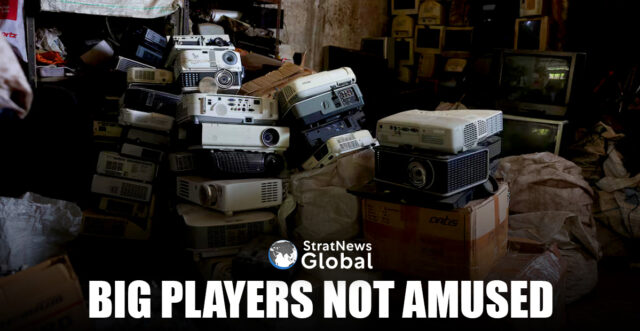India is introducing stricter rules to tackle its growing e-waste problem, requiring electronics manufacturers to pay more for recycling products like air conditioners, refrigerators, and TVs. Companies like Daikin, Hitachi, and Samsung are pushing back, arguing the costs are too high, according to court filings and lobbying efforts.
The electronics giants are urging environment officials to abandon the approach, with four companies suing Prime Minister Narendra Modi’s administration in New Delhi over the measures they say will heighten compliance woes and unsettle businesses.
The previously unreported standoff marks the latest chapter in foreign companies’ battles with India over what some perceive as protectionist policies and shifting regulatory goal posts.
Tripling Costs
India is the third-biggest e-waste generator behind China and the U.S. But government data shows only 43% of the country’s e-waste last year was recycled and at least 80% of the sector comprises informal scrap dealers, whose methods can pose environmental and health risks.
Concerned about poor waste-processing practices, New Delhi in September set a floor price that electronics makers must pay recyclers, with the aim of formalising the sector and encouraging investment in e-waste management.
A Reuters review of hundreds of pages of non-public court papers and letters to the government by an industry group representing Samsung and LG reveals the impasse over the new rates, which the industry says have roughly tripled manufacturers’ recycling costs.
Unconstitutional Measures
Johnson Controls-Hitachi, Japan’s Daikin, India’s Havells and Tata Group’s Voltas each sued Modi’s government between November and March to quash the pricing rules.
The measures are unconstitutional, exceed the government’s powers under environmental law, and raise compliance costs manifold, the companies said in submissions to New Delhi judges. The government has called for the cases to be dismissed.
Daikin said no Indian government had ever previously drafted policies with the “sole intention” of providing financial gain to some businesses, in this case recyclers, at others’ expense. Voltas predicted a “cascading effect” on product prices.
India’s consumer electronics market, projected to reach $62 billion this year, has grown rapidly with a 10% annual increase since 2021, driven by urbanisation and rising sales. As production expands, e-waste has surged to 1.7 million metric tons in 2023–24—more than double in six years.
Companies like Daikin, Hitachi, and Samsung are concerned about new recycling cost rules, but have largely remained silent, with Samsung declining to comment and others not responding to Reuters’ inquiries.
‘Reasonable’ Intervention
For years, India has resisted foreign companies’ demands to revoke protectionist policies. Lobbying by Walmart and Amazon, for example, failed to ease regulations that protect small retailers.
On e-waste, too, Modi’s administration is digging in.
In a March 18 court filing, India’s Environment Ministry defended its right to set recycling prices, calling it reasonable and necessary to ensure proper e-waste management.
The ministry warned that allowing companies and recyclers to set their own prices could lead to cost-cutting and unsafe practices.
While India has 322 authorised recyclers, informal waste handlers still dominate, often using hazardous methods like open burning and acid leaching.
In western Gujarat state, 60-year-old scrap dealer Mustakeem Malik uses a hammer to dismantle televisions, air conditioners and routers.
Inside his tin-roofed shed where electronic equipment was stacked in haphazard piles, Malik told Reuters he earns 50,000 rupees, or about $580, a month by selling the plastic, circuit boards and copper he extracts from the devices. He doesn’t want to work in the formal e-waste sector.
“That business has a lot of expenses. It’s for the big guys,” he said.
Happy Recyclers, Worried Companies
India’s new e-waste rules set minimum recycling payments at 22 rupees per kg for consumer electronics and 34 rupees per kg for smartphones.
Manufacturers of heavier devices like air conditioners face higher cost increases compared to those producing lighter gadgets, making them more affected by the new regulations.
Research firm Redseer in February said India’s recycling rates were still low compared with the U.S., where they are up to five times higher, and China, where they at least 1.5 times higher.
“We are talking about peanuts here,” said Nitin Gupta, CEO of one of India’s biggest recyclers, Attero, who added that the government rates require manufacturers to pay about $10 to recycle a washing machine.
“If you have to create scientific capacity for recycling, you need extra profits. This is good for us,” said Gupta, whose firm counts LG and Daikin as clients.
The electronics makers, though, feel threatened.
India’s Consumer Electronics and Appliances Manufacturers Association, representing companies like LG and Samsung, told the government that e-waste compliance now costs 2% to 8% of production expenses.
While neither company has sued, both have expressed concern—LG even noted in its IPO prospectus that higher recycling costs have significantly impacted its finances.
A person with direct knowledge of the matter said Samsung had told senior Indian officials its recycling costs would be five to 15 times the previous rates, and urged New Delhi not to interfere in commercial dealings with recyclers.
In court, Johnson Controls-Hitachi was the only company to reveal what it previously paid for recycling: 6 rupees per kg, or 7 U.S. cents. That figure has now almost quadrupled.
The company disclosed that it recycled more than 10,000 tons of air conditioners last fiscal year, which would amount to roughly $2.6 million under the new rates. Its India business reported a net loss of $8.8 million the previous year.
(With inputs from Reuters)





